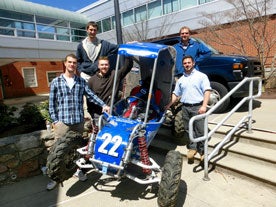 KINGSTON, R.I., April 5, 2016—It’s no secret that the American economy could use more engineers, and now the University of Rhode Island is bringing scholars from throughout the country to brainstorm about ways to make that happen.
KINGSTON, R.I., April 5, 2016—It’s no secret that the American economy could use more engineers, and now the University of Rhode Island is bringing scholars from throughout the country to brainstorm about ways to make that happen.
URI is hosting the American Society for Engineering Education Northeast Conference April 28 through 30 on the Kingston campus. The topic this year is “Revolutionizing Engineering Education.”
About 400 professors and students representing more than 60 colleges and universities are expected to attend. There will be 200 student posters, 67 student papers and 87 faculty papers, as well as exhibits and a career fair featuring Dassault Systems, Comsol and Mathworks, among others. Twelve awards will be given out to graduates and undergraduates.
Twenty-one teams of URI engineering students are presenting posters about cutting-edge research and projects, says Bahram Nassersharif, conference coordinator and a professor in the Department of Mechanical, Industrial and Systems Engineering.
One team created a residential wind turbine that homeowners can install themselves. Another project is an amphibious drone that can take off from a water surface and then return to land. One team researched how to disinfect barrels storing chemicals, and another group created a “wingman,” a device attached to the tip of airplane wings to alert workers when a plane is getting too close to the walls of the hangar where it’s being stored or maintained.
 “The student projects this year are amazing,” says Nassersharif. “I’ve been teaching capstone for nine years, and every year it seems to get better and better. I think that says a lot about the URI program and the caliber of our students.”
“The student projects this year are amazing,” says Nassersharif. “I’ve been teaching capstone for nine years, and every year it seems to get better and better. I think that says a lot about the URI program and the caliber of our students.”
The conference comes as URI moves forward with a new College of Engineering facility, a 195,000-square foot building that will replace five existing engineering buildings on the Kingston campus, all of which opened in the late 1950s and early 1960s. The last time URI hosted the conference was 2006.
“We’re honored to be hosting such a prestigious group of faculty and students from the region,” says Nassersharif. “This is a great opportunity for URI students to present their capstone design projects and compete with other students in the region for best papers and posters.”
The conference’s keynote speaker is George Hazelrigg, deputy division director of the Division of Civil, Mechanical and Manufacturing Innovation at the National Science Foundation. Hazelrigg, who has been at the National Science Foundation for 33 years, has a doctorate in aerospace engineering from Princeton University and has worked at the Jet Propulsion Laboratory, General Dynamics and Princeton University.
URI chatted with Hazelrigg recently about his talk, “The Engineer as a Decision Maker,” in which he presents a new paradigm for engineering education.
What’s your talk about?
My talk is about our current approach to teaching engineering, and the deficiencies in that approach. Specifically, I will challenge the notion that engineers are problem solvers and present an alternative that I believe would increase the value of an engineering education and improve the employment opportunities for engineers.
Should colleges and universities change the way they teach engineering?
To put it bluntly, there are mistakes in some of the theories we teach and they need to be corrected. Beyond this, our current approach to engineering education does not fully prepare graduates to enter the engineering workforce. This is particularly the case in the area of engineering design, which, in my opinion, is the backbone of engineering education.
How important is hands-on learning for engineers—and problem-solving skills? What’s important today: the textbook, the lab or an internship?
I believe that what is important is that our graduating engineers have an ability to think through whatever assignment they are given, and to have the ability to assess the validity of whatever processes or approaches they employ. They need to be able to make sense of what they are doing, and to make good engineering choices.
What advice would you have for a high school student thinking about studying engineering in college?
My advice to anyone at this point in his or her life is to give serious thought about what you want from your life. Take the time to examine the careers available to you, and think about what you really want to do for the next half-century. Then plan your life, don’t just let it happen to you. This is the time in your life when you have the most control over your future that you will ever have. If you have a passion for engineering, then go for it.
Besides Nassersharif, the other URI professors and staff giving workshops or presentations or organizing sessions are:
* Gretchen Macht, assistant professor, Department of Mechanical, Industrial and Systems Engineering.
* Mayrai Gindy, professor and chair, Department of Civil and Environmental Engineering.
* K. Wayne Lee, P.E., professor, Department of Civil and Environmental Engineering.
* Carl-Ernst Rousseau, P.E., professor and chair, Department of Mechanical, Industrial and Systems Engineering.
* George Veyera, professor, Department of Civil and Environmental Engineering.
* Richard Vaccaro, professor, Department of Electrical, Computer and Biomedical Engineering.
* David Taggart, professor, Department of Mechanical, Industrial and Systems Engineering.
* Charles Watson, assistant director, diversity, College of Engineering.
* Sigrid Berka, executive director, International Engineering Program.
* Jared Abdirkin, assistant dean, College of Engineering.
Pictured above: URI engineering students exhibiting their capstone design projects in 2015. Photo courtesy of URI College of Engineering.

